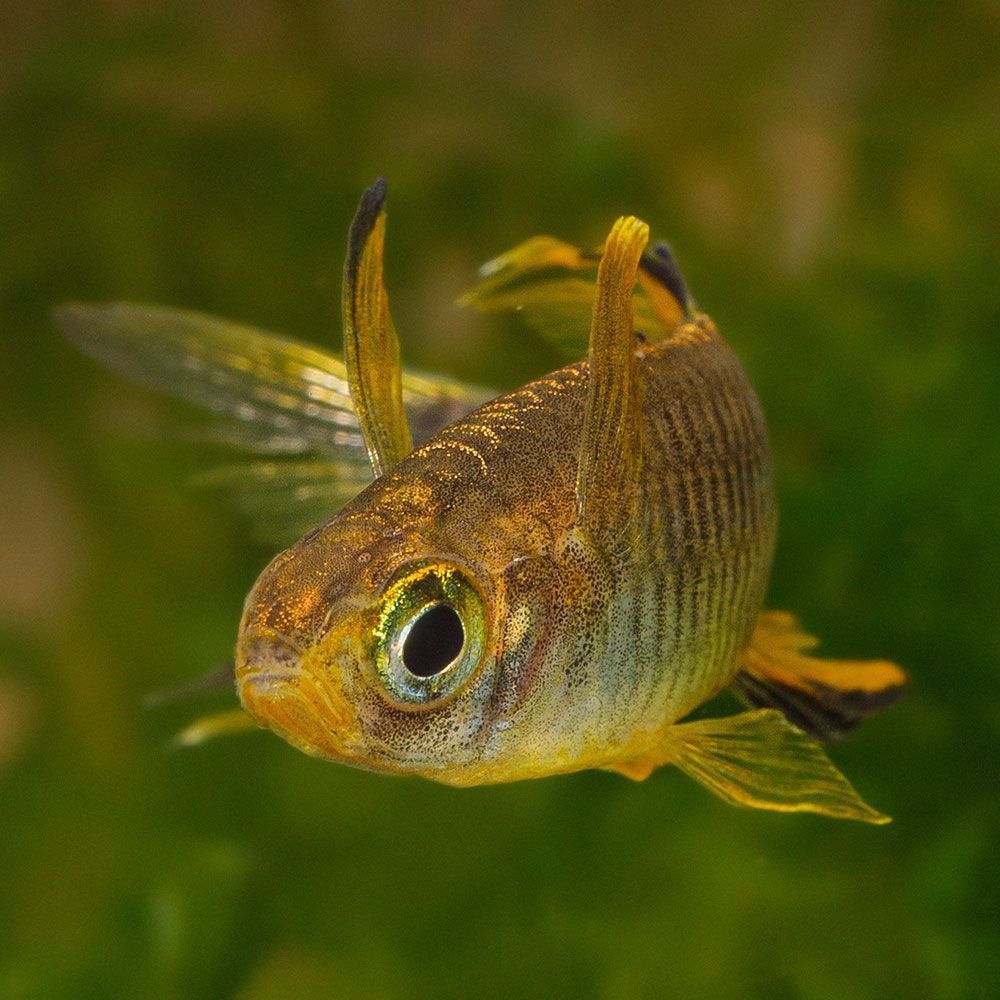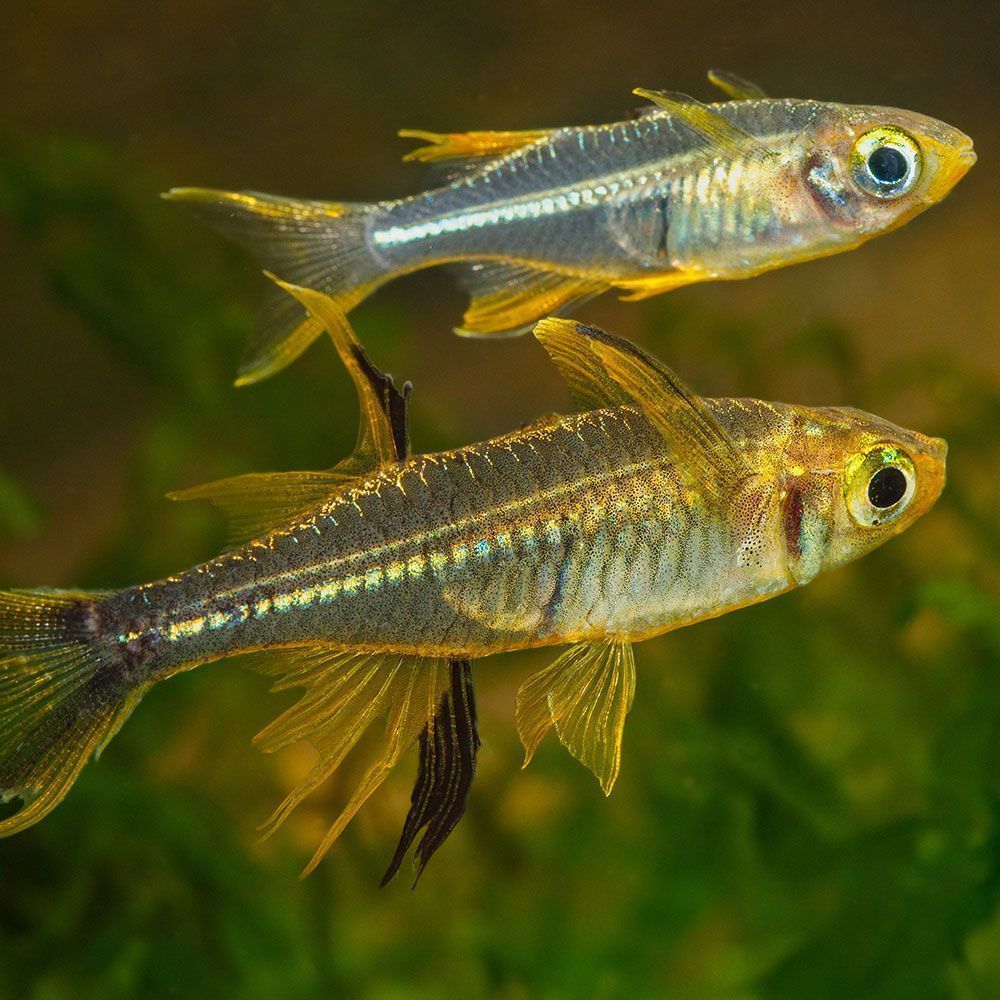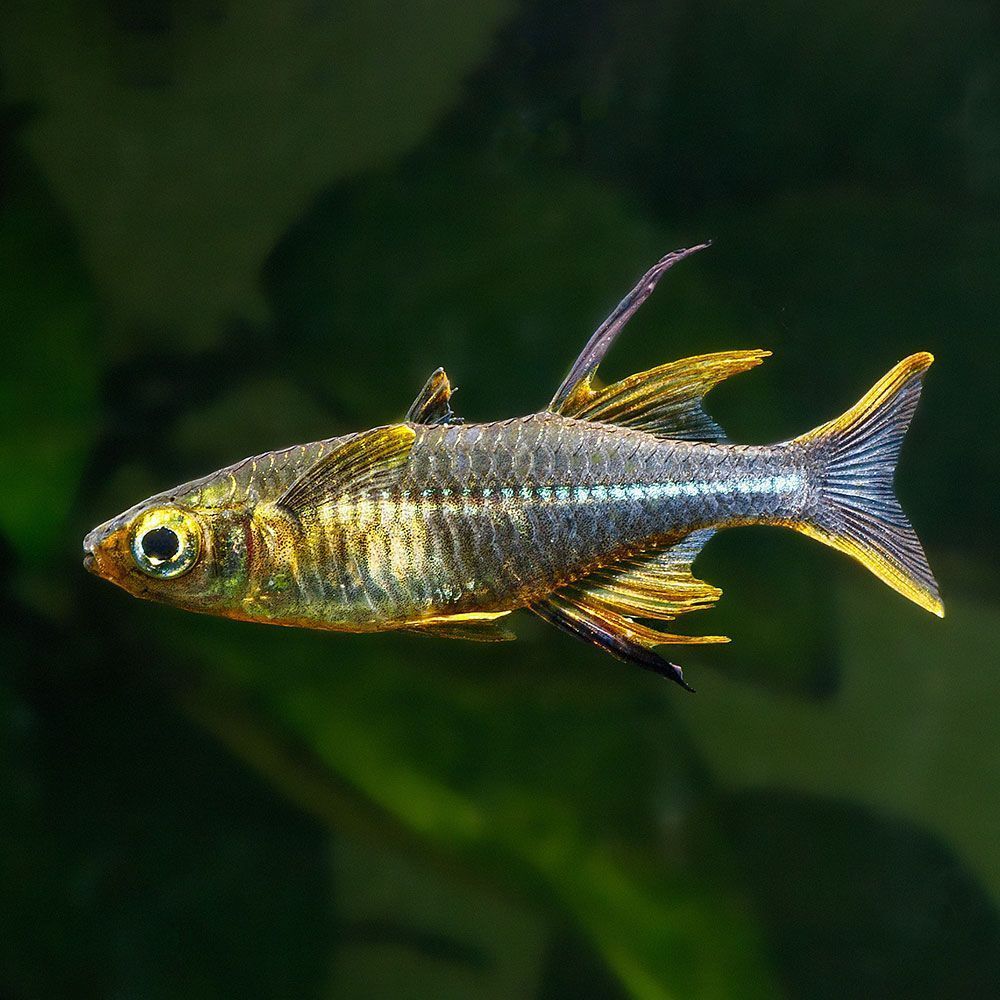Celebes rainbow is a little freshwater fish popular for its unique beauty. The peaceful species can be added to any community tank with species of the same size and temperament.
It is not picky, so there won’t be any trouble at meal times. With slight experience in fishkeeping, raising this fish will bring you ultimate satisfaction.
Now, if you are curious to know about this beautiful fish, read on!
What is a Celebes Rainbowfish?
A celebes rainbowfish is a freshwater fish that is a combination of silver, white and yellow in color and perfect to keep in a fish tank with other compatible fish. Let us learn more about this fish below:
| Origin | Sulawesi, Maros Karst, Indonesia |
| Order | Atheriniformes |
| Family | Melanotaeniidae |
| Scientific Name | Marosatherina ladigesi |
| Common Names | Celebes rainbow fish, Celebes sailfin, Celebes sailfish |
| IUCN Red List Status | Vulnerable |
| Appearance | Whitish or transparent body, with forked fins with yellow margins |
| Size | Up to 8 cm (3.2in) |
| Lifespan | 3-5 years, max 8 years |
| Temperament | Peaceful, active |
| Tank Level | Middle-dweller |
| Water Temperature | 72-82 °F (22-28 °C) |
| pH Level | 7-8 |
| Water Hardness | 9-19 dGH |
| Care Level | Intermediate to Expert |
| Minimum Tank Size | 20 gallons for one |
| Tank Environment | Spacious, heavily planted |
| Diet | Omnivorous |
| Tank Mates | Own group, other similar-sized, peaceful fishes |
Where is Celebes Rainbowfish found?
Naturally, Celebes rainbow fish is found in the Bantimurung, Maros Karst area in South Sulawesi, Indonesia.
It inhabits the clear, slow-flowing streams around the foothills and estuarine areas of the island of Sulawesi.
The species is also found in both fresh and moderate to fast-flowing brackish water estuaries. In this area, the freshwater river meets the ocean. Owing to excess turbulence, its habitat is rich in oxygen.
According to The IUCN Red List of Threatened Species assessment of 2019, this species was given the status of Vulnerable.
But this only talks about the population of fish in the wild. It’s known that there are quite a lot of specimens in captivity.
Which family does Celebes Rainbowfish belong to?
The fish belongs to the Melanotaeniidae family, Telmatherinidae subfamily under the Atheriniformes order and is scientifically known as Marosatherina ladigesi.
But this fish is also known by many other names worldwide, like Celebes rainbow fish, Celebes sailfin, and Celebes sailfish.
Fun Fact: This fish is known as the Celebes rainbowfish because Sulawesi Island was earlier called Celebes.
How does Celebes Rainbowfish look?

Now, if you want to be able to recognize this little beauty, you have to read these details here!
What is the size of Celebes Rainbowfish?
The maximum size of the Celebes rainbow fish is up to 8 cm (3.2in).
The males are usually 6-8 cm (2.4-3.2 in) in length. In comparison, the females are a little smaller and grow up to 5-7 cm (2-2.8 in) in length.
What is the Color of Celebes Rainbowfish?
This Celebes rainbow fish is predominantly silvery white with specks of yellow spread throughout. It has a neon stripe along its side, which reflects blue and green colors.
The pectoral fins are whitish or transparent and may have black or white tips, while the other fins are yellow with black marks.
The two dorsal fins have different colors – one is small and black and the other is larger and has two tones.
The unique color pattern on the body of this species might even have hints of blue and gold hues.
This fish is also found in color varieties like red, blue, purple, green, yellow, and orange.
What are the Features of Celebes Rainbowfish?
Celebes rainbow boasts a slender, torpedo-shaped body, a small mouth, large eyes, and unique fins. It has unique filaments flowing out of its dorsal fins, which give it a ‘sail-like’ effect.
The caudal fin is symmetrical on the top and bottom and has a forked shape. The pectoral fins are a bit smaller and begin at the base of the gill plate.
The back of this fish is transparent enough for an organ sac and bones to be visible. The fish scales are translucent in this area.
What is the difference between a male and a female Celebes Rainbowfish?
The adult male Celebes is generally larger than the female and has stronger coloration. It shows long black ventral and dorsal fins, which are wispy.
The female is smaller in size and has a paler coloration as compared to its male counterpart. It also lacks the elongated fins of the male and has a rounder shape.
What is the Behavior of Celebes Rainbowfish?
Celebes rainbow is quite peaceful but active in a tank. It is a slow-eating, non-aggressive fish that likes to swim at a languid pace.
It is a schooling fish and lives its best life in a group of at least 6.
What is the Lifespan of Celebes Rainbowfish?
Usually, celebes rainbow fish lives up to 3-5 years. But, with great care and suitable water conditions, its lifespan can extend up to 8 years.
Author’s Note: The genus name of the fish is made from the village name near which the fish is found – “Maros” compounded with the silverside genus name “Atherina.” Its specific name is an honor to the collector of this fish type – Werner Ladiges – German ichthyologist.
how to take care of Celebes Rainbowfish?

Now, if you can’t wait to add this fish to your aquarium, let us tell you more about how to care for this species.
What Tank Size should be used for Celebes Rainbowfish?
Celebes rainbow fish is very active, so you will need a 20-gallon tank to keep one fish.
But in my experience, this species lives best in big groups. So you should get a tank of 60 gallons to keep at least seven of them together.
It is also known to be very good jumpers, so make sure you have a fitted lid on your tank to prevent them from jumping out of the water.
What Water Chemistry should be used for Celebes Rainbowfish?
Celebes rainbows are particularly sensitive to water conditions and don’t do well with acidic water. So, to give your fish the best care, strictly follow these parameters.
- pH Levels: 7-8
- Water Temperature: 72-82 °F (22-28 °C)
- Water Hardness: 9-19 dGH
- Ammonia: 0 ppm
- Nitrite: 0 ppm
- Nitrate: Less than 15 ppm
What Tank Environment should be kept for Celebes Rainbowfish?
To keep your pet fish happy, make its tank as much to its liking. For that, here are a few things to follow.
Do you need Substrate for Celebes Rainbowfish?
Celebes rainbow is quite delicate, so avoid anything too sharp or abrasive. Both fine gravel and sand are good choices, but as long as it is not too rough in texture, any substrate of your choice can be used.
If you want to highlight the beautiful colors of this fish, use a dark substrate for contrast.
Which Plants fo you need for Celebes Rainbowfish?
The rainbow enjoys a densely planted tank with leafy plants. You should use floating plants like duckweed to control the lighting of your tank.
Some plants that tolerate brackish and hard water that this fish likes are water wisteria, hornwort, and java moss.
What type of Lighting should be used for Celebes Rainbowfish?
You should use dim lighting as this fish is more active at night. The low light will also help enhance the colors of this fish and make your tank visually appealing.
You can place the tank in a place where it can bask in sunlight for a few hours in the morning.
What type of Décor should be used for Celebes Rainbowfish?
This species likes to have spaces to hide, so use rocks, caves, and driftwood to decorate your tank. But make sure to leave a lot of free space for the school to swim around.
Which filter in the aquarium is needed for Celebes Rainbowfish?
Celebes rainbow is extremely sensitive to water quality. Opt for a good filter that aerates the tank well, eliminates waste buildup, and maintains suitable oxygen levels.
What is the Water Flow Rate in the aquarium with Celebes Rainbowfish?
This fish enjoys a moderate current.
Fish Care Tip: Change 25-50% of the water weekly to reduce the chances of waste buildup.
What do Celebes Rainbowfish eat?
The celebes rainbow is omnivorous, but you must offer diverse foods to provide good nutrition and enhance its coloration. It can fall sick when it is given hard food, so it’s wise to pick soft, small kinds of foods, like:
- Flakes
- Granules
- Micropellets
- Brine shrimp
- Mosquito larvae
- Daphnia
- Small worms
- Repashy
- Tubiflex
- Bloodworm
Feed them for about 5 minutes or less for two to three times daily.
Which are the Tank Companions for Celebes Rainbowfish?
This rainbow fish does well with most tankmates of its size and temperament. But before that, keep it together with a school of its kind with 6-10 members where there are 2-3 females per male fish.
Some other tank mates that can be considered are:
- Gobies
- Mollies
- Halfbeaks
- Swordtails
- Endlers livebearers
- Harlequin rasboras
- Other rainbowfish
- Shrimps
- Crabs
- Snails
Which Tank Mates to Avoid with Celebes Rainbowfish?
Avoid tankmates that will make your fish feel unsafe in its own home, like:
- Aggressive and semi-aggressive species: These are threatening to the rainbows.
- Fin nippers: They may nip the delicate fins of this rainbow, which may cause diseases.
- Larger species: These will compete for food and make your celebes quite shy and scared.
- Softwater fish: Celebes prefer brackish hard water, so softwater species are not a good match for this species.
To give you a sneak-peak, here are some fishes that you must avoid at all costs:
- Barbs
- Bettas
- Cichlids
- Loaches
- Tetras
What are the Common Diseases that can happen to Celebes Rainbowfish?
Celebes are quite delicate and prone to common freshwater fish diseases. Even experienced aquarists can feel challenged to keep this fish healthy, but it is not impossible to do this. Keep these symptoms and treatments in mind:
| Disease Name | Causes | Symptoms | Treatment |
|---|---|---|---|
| Ich | Protozoan Parasitic infection | Flashing, white spots, inactivity, appetite loss | Raise water temperature, add aquarium salts or ich medication, |
| Fin rot | Bacterial infection | Fin discoloration or redness, inactivity, appetite loss, fin disintegration, fin fraying | Improve water quality, remove any object that may hurt the fish, add antibiotics |
| Columnaris | Bacterial infection | Inactivity, appetite loss, fin fraying, white patches | Reduce stress, add antibiotics, enhance water quality |
| Velvet disease | Parasitic infection | Fish turns a dusty brownish-gold color | Add salt to the water |
Quick Tip: Add half a tsp of salt for every gallon of water in the tank to prevent common infections.
How to Breed Celebes Rainbowfish?
This fish is quite easy to breed if you provide the correct environment for them. So, if you want to do it too, closely follow the guidelines written next:
What are the Tank Preparation guidelines for Celebes Rainbowfish?
Prepare a separate 40-gallon tank with a dense plantation to catch the scattered eggs. Use plants with fine leaves or nylon spawning mops for this purpose. Plants like milfoil, Cabomba, Riccia, and java moss are the best choice.
You don’t need substrate for this tank.
Follow the below water chemistry to spike chances of successful breeding:
- Water Temperature: 72-74 °F (22-23 °C) [Celebes rainbows spawn at lower temperatures]
- pH Levels: 7-7.5
Add a little salt to the tank to keep diseases at bay. Air-powered filters are a good choice to keep the tank clean.
Pair Obtaining & Conditioning
Condition all the specimens in the main tank with lots of frozen and live food. When the celebes are ready to mate, the females become plump, and the males flaunt their bright bodies to each other.
Once the fish shows signs of readiness for mating, separate them into a breeding tank. Choose a breeding group of 2-3 females and one male. Or pick a pair from the healthiest specimens – the fattest female and best-colored male.
To encourage breeding, keep the tank under a window as morning sunshine triggers spawning behavior.
What happens in the Mating Process of Celebes Rainbowfish?
Celebes rainbows are egg scatterers, so the pair engages in a courtship ritual and scatters eggs all around the tank and the plants.
This species is called ‘continuous spawners,’ so eggs will be deposited over a period of time, like a few days or weeks. They lay a batch of eggs almost every day and attach the eggs to surfaces with thread-like structures.
When should the Eggs of Celebes Rainbowfish be Separated?
The eggs should be separated as this fish eats its own egg. Raise the eggs and fry separately until they are large enough not to be eaten by the adult fish. Fill this “raising tank” with water from the spawning tank to avoid the sudden shock of atmospheric change.
When do the Celebes Rainbowfish eggs hatch?
Typically, the eggs will hatch within 5-14 days time, depending on the water temperature. It develops and starts swimming within 4 days’ time.
Fry Tank Maintenance
For the first 4 days, the fry will eat from its own yolk sac, after which they will need fry food. Begin feeding with infusoria, and you can slowly shift to finely grated baby brine shrimp.
Breeding Tip: Check for new eggs on the plants and spawning mops regularly. If you miss a single day, the previous day’s eggs will get eaten.
What are the Buying Tips for Celebes Rainbowfish?
Always buy a group of them together from the same shop. This will ensure they all are of the same age and mature around the same time. It’ll be easier to keep track of their age, especially if you plan to breed them.
A word from FishInAquarium
Celebes rainbows can bring a spark of bright colors to your tank. When they swim around, they look like a wave of rainbows – which makes your tank seem extravagant. It’s also pretty fun to breed the fish.
So, if we have been able to convince you to show this species some love, do not forget to share it with other fish enthusiasts.
And if you have any questions on this journey, do not hesitate to drop us an email, and we will sort it all out.


